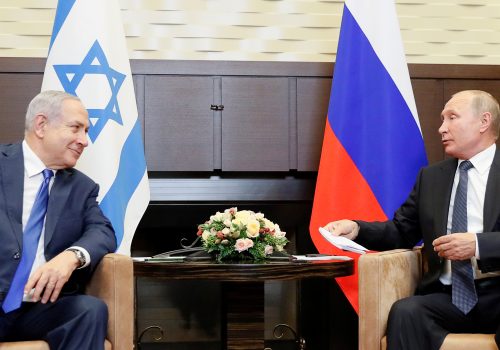Experts React: Israel might have a new government. What’s next?
A wide range of Israeli political parties—including those led by the right-wing politician Naftali Bennett and the centrist Yair Lapid—have reached a deal to unseat Israeli Prime Minister Benjamin Netanyahu. Below, Atlantic Council experts react to the news and assess the significance of the coalition’s push to oust Israel’s longest-serving prime minister.
Jump to an expert reaction:
Jonathan H. Ferziger: Post-Netanyahu government distinguished by its frayed seams
Carmiel Arbit: Time for Israelis to heal and move forward
Shalom Lipner: A paradoxical moment for Israelis
David Daoud: A fragile “Change Government”
Matthew Zais: New government, new energy development and partnership opportunities
Post-Netanyahu government distinguished by its frayed seams
Dislodging Benjamin Netanyahu from the Israeli prime minister’s residence in Jerusalem is a feat of political engineering. Whatever cabinet emerges now that Naftali Bennett and Yair Lapid worked out a rotation agreement—in which each expects to serve for two years as prime minister—will be distinguished by its loose and frayed seams. Now that Netanyahu is out of the way, the eight parties that comprise this minority coalition government will find it challenging to focus on common ground. Chances are unlikely that the champions of West Bank settlement in Bennett’s Yamina Party will be able to subdue their distaste for the outspoken settlement opponents in the Meretz and Labor parties and work together for long. The fact that the government’s viability will depend on the continuing goodwill of the Muslim fundamentalist Ra’am Party—which won’t formally hold a cabinet seat, even as it agrees to support the coalition in parliament—is an obvious weakness that could spell its downfall at any time.
As Bennett and Lapid struggle to govern together, they will face unrelenting attacks from Netanyahu and his Likud Party, who will aim at their clear ideological fissures. Another outbreak of violence with the Palestinians that exposes the sharp political differences within the new Israeli cabinet could make this a very short-lived government. As the post-Netanyahu era dawns, its architects face a formidable challenge in building foundations that can sustain the powerful blowback coming the new government’s way.
Jonathan H. Ferziger, Nonresident Senior Fellow with the Atlantic Council’s Middle East Programs.
Time for Israelis to heal and move forward
If indeed a “unity government” in Israel is sworn in, it will be met with a collective sigh of relief for the majority of Israelis and Israel watchers alike. Israelis can take a moment to heal and move forward; after three years, the government will finally be able to form a budget, proceed with judicial appointments, expand economic programs and perhaps even pursue legal reform. And after years of incendiary behavior, the US-Israel relationship—or more accurately the Israel-Democratic Party relationship—has a chance to turn the page as well.
If Israelis are lucky, after years of hysteria, they will be rewarded with the same technocratic tranquility that has returned to Washington. If they are less lucky, the calm will be short-lived. Beyond a shared desire to remove Netanyahu, the divisions between the parties are deep and profound. The result could be a fragile—and potentially fluid—coalition with a weak Prime Minister Bennett as its figurehead. And, while the international community lines up to write political obituaries for Netanyahu, they will be appalled to discover that Bennet shares equally—if not more—troubling views as his predecessor and one-time mentor. The world can take solace in knowing that a coalition this fragile will not pursue annexation, but the coalition is also unlikely to deliver meaningful concessions to the Palestinians, which the US and its allies eagerly seek. The onus will thus fall to Yair Lapid, a moderate voice who has demonstrated remarkable political shrewdness in fastening the coalition to not only keep the government together, but also to help shore up Israel’s most important relationships overseas.
Carmiel Arbit, Nonresident Senior Fellow with the Atlantic Council’s Middle East Programs.
A paradoxical moment for Israelis
Israelis face the welcome prospect—for the first time since December 2018, when a rapid sequence of four inconclusive elections was triggered—of a government with a fighting chance at governing. Naftali Bennett, Yair Lapid and its other principals aspire to inject a degree of stability into Israel’s tumultuous politics. Their job, assuming that they cross the threshold of being sworn into office, will be challenging to say the least.
Comprised of parties from the right, center, and left of Israel’s ideological spectrum, the new government will be fueled primarily by goodwill. Its members, united almost exclusively in their (successful) quest to unseat Benjamin Netanyahu, who served uninterruptedly as Israel’s prime minister from March 2009, have pledged to focus their efforts narrowly on a modest, “technical” agenda: restoring effective governance and civil discourse to the country, which has been reeling from the effects of divisive rhetoric that pervades the public sphere. That tall order will include passage of a national budget—something not done in Israel since March 2018—certification of multiple ambassadorial appointments that have been suspended in limbo and oversight of Israel’s emergence from the COVID-19 pandemic. The spirit of cooperation embraced publicly by ministers of the incoming cabinet will facilitate their progress in these fundamental tasks—progress which eluded their immediate predecessors.
But this amalgamation is predicated on the subordination of all points of controversy—an explicit acknowledgement that opening the Pandora’s box of issues (over which component parts of this government are in fierce disagreement) could hasten the demise of the entire unity project. As much as the government might wish to avoid stepping on these potential landmines, its detractors—led by an energized Knesset opposition under Netanyahu’s stewardship—will be fully invested in aggravating the fault lines that threaten to tear the fragile coalition apart. Forcing debate on questions such as the fate of the settlement enterprise, the role of Israel’s judiciary, and the place of religion in public life, the government’s opponents will test its endurance relentlessly, hoping to provoke its implosion. Additionally, the prerogatives of responding to (un)expected crises that will yet be foisted upon the government by external actors—renewed hostilities with Hamas or an escalation with Iran are but two examples—could expose acute differences of approach that jeopardize the integrity of the new leadership.
This is a paradoxical moment for Israelis, full of both hope and apprehension, as the country embarks on an experiment with a new kind of politics. When and how it ends is still a mystery.
Shalom Lipner, Nonresident Senior Fellow with the Atlantic Council’s Middle East Programs.
A fragile “Change Government”
This “Change Government” will be the most ideologically diverse in Israel’s history, divided by fundamental fault lines on critical issues, including peace with the Palestinians, West Bank annexation, asylee absorption, the Supreme Court’s powers, and religion-state issues. Hammering out a coalition deal between these parties before midnight Wednesday will be a feat.
Israel only stands to benefit when a “Change Government” is sworn in. Fears that it will be a “far right” government, simply because it will be led first by Naftali Bennett, are exaggerated. Bennet is indeed to the right of Netanyahu on critical issues, including annexation and opposition to a two-state solution. But, Bennet’s Yamina party is united with its coalition partners in prioritizing the avoidance of a fifth election and opposing Netanyahu’s return to the premiership. The ideological fault lines making the Change Government so fragile would therefore temper the worst of Bennet’s instincts. He must maintain the support of the Leftist, Centrist, and Arab backers of the coalition. Therefore, a “Change Government” will in fact maintain the status quo. It may fail to make significant advances on the critical issues, but its fragility will constrain it from doing harm. More importantly, for as long as this government lasts, it will also distance Israel from the Netanyahu years, slowly decoupling the country’s fortunes from those of a man who has prioritized his well-being above that of the state. By forcing Netanyahu to recede from the public sphere, such a government could contribute to the restoration of some sensibility (and variety—the lifeblood of democracy) to Israeli politics. Perhaps this outcome will even chasten Likud, forcing that party to rethink its bet on Netanyahu’s divisive and populist politics.
David Daoud, Nonresident Senior Fellow with the Atlantic Council’s Middle East Programs.
New government, new energy development and partnership opportunities
We should watch closely how Israel’s new government and the ensuing cabinet reshuffle will impact its regional energy development and partnerships. Benjamin Netanyahu’s energy minister, Yuval Steinitz, used his position and close relationship with Egyptian Energy Minister Tarek El-Molla to establish the East Mediterranean Gas Forum (EMGF) and advance his vision for the EMGF’s expansion beyond the Mediterranean and natural gas. In January, the United States was working with Egypt and the Abraham Accord signatories to attract Saudi Arabia, expand into the Red Sea, and support struggling energy economies like Sudan. However, Joe Biden’s cabinet transition resulted in the US stepping away from the EMGF and instead focusing on domestic and international climate objectives. It will be interesting to see how the region develops affordable and cleaner energy partnerships, such as the EMGF, without both the US and Steinitz’s leadership.
Matthew Zais, Nonresident Senior Fellow with the Atlantic Council’s Middle East Programs.
Image: Leader of the Yamina party Naftali Bennett delivers a statement in the Knesset, the Israeli Parliament, in Jerusalem May 30, 2021. Yonatan Sindel/Pool via REUTERS


